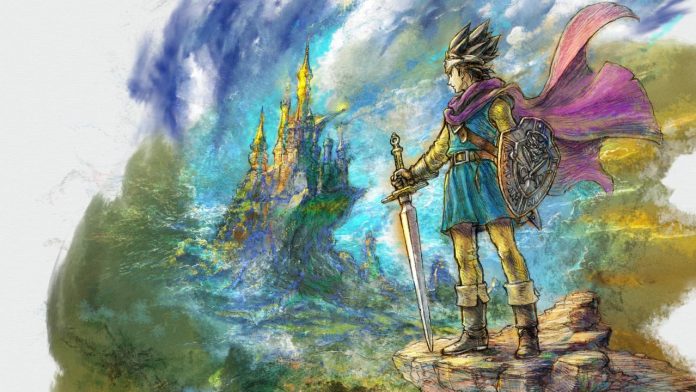You always know what you’re getting with a mainline Dragon Quest game. The series is pretty much the epitome of consistent, having stuck to its timeless Japanese RPG formula for decades. But that comfy feeling of familiarity somehow hits even harder with Dragon Quest 3 HD-2D Remake — a powerfully nostalgic rebuild of a true classic.
In franchise canon, Dragon Quest 3 takes place before 1 and 2; it’s like an origin story for the series’ recurring heroes and themes. But it’s also from a time when narrative depth wasn’t a priority. Aside from some late-game revelations, the title’s plot is incredibly straightforward. You’re the chosen one and the Big Bad must be stopped. What more reason do you need to embark on a globetrotting fantasy adventure?
Basic stuff, but in typical Dragon Quest fashion, it’s all delivered with a huge amount of charm. As always, the dialogue is wonderfully localised and the remake even has voice acting — although it is a rarity. The vast majority of text is just that — text — but key scenes are given a bit of extra spice through spoken word.
The remake also brings some brand new story elements to the table, most of which expand upon the protagonist’s father, Ortega. Being able to relive glimpses of Ortega’s escapades is a nice touch, but don’t go into this remake expecting any major adjustments; the new bits and pieces are few and far between.
At this point you might be thinking that the remake’s additions are rather minimal, but as the awkward ‘HD-2D Remake’ name implies, the real star of the show is the game’s complete graphical makeover. Environments now consist of 3D assets entirely — complete with some gorgeous lighting effects — and as you’d expect, this visual evolution is transformative.
The adventure is given a much greater sense of place and purpose thanks to the overhaul. Towns and cities have never looked more inviting, but we’re perhaps most impressed with the overworld map. The game’s sprawling wilderness feels vast and much more memorable in 3D, with varied terrain — both in terms of looks and elevation — greatly enhancing the actual journey between locations.

Speaking of which, the remake comes with optional objective markers. Those familiar with old-school RPGs will know how obtuse they can be with regards to progressing the story — and Dragon Quest 3 has these potential hurdles in abundance. Especially later on, when you’re free to traverse much of the map, plenty of players will be thankful for an objective marker or two.
The remake’s quality of life improvements cover combat as well — but we find ourselves wondering whether it could have gone even further.
First up, you can increase the speed of battles, which is something to be truly thankful for. While we enjoy Dragon Quest’s basic but pleasantly tactical combat system, the remake retains the original’s often glacial pace as attacks are exchanged alongside informative text pop-ups. Being able to speed that along really is a game-changer.
Tying into that, the remake offers two new difficulty settings which can be selected at any time. ‘Dracky Quest’ is described as a more casual mode, while ‘Draconian Quest’ is for the hardcore.

But regardless of which difficulty you’re on, there’s no getting away from the fact that Dragon Quest 3 is a grindy game. Whether you need just a few extra levels to even the odds or you’re short on gold, grinding through battles that barely tickle your brain is an eternal part of the series’ DNA.
And here in the remake, you really start to feel the tedium. In its move to 3D environments, the overall scope of the game’s world has been expanded quite significantly; dungeons are actually bigger than they once were, and the world map is colossal by comparison. However, the rate at which you encounter random battles is seemingly unchanged — and that’s a problem.
Sometimes, it’s like you can’t walk for more than ten seconds without being hit with yet another battle. In particular, later dungeons can become a serious slog, especially when you’re backtracking to missed treasure chests, and you’re just being bombarded with fights against tougher monsters.

You can make use of items that temporarily prevent encounters, but that ends up feeling like a workaround for an issue that’s unnecessarily exasperated here in the remake.
Again, given the other quality of life updates that the remake provides, the balance feels off. Ultimately, ways to lessen the grind would be welcome — and a toggle that reduces the number of random battles would make the whole thing much easier to stomach, especially if you’re new to the traditional Dragon Quest formula.
But aside from these gameplay hangups, it’s honestly hard to fault this reimaging. The stuff that made Dragon Quest 3 great is still present, like being able to create your own party members and assign them unique jobs, and it’s flanked by worthwhile additions, like the inclusion of a full-on monster arena. Put everything together, and this comes across as a robust but welcoming RPG.
Conclusion
That eternal Dragon Quest charm is especially potent in Dragon Quest 3 HD-2D Remake — a thoughtful repackaging of a classic RPG. With its quality of life additions and delightful 3D visuals, it’s easy to argue that this is the adventure’s definitive form — even if some of its structural weaknesses remain in place.

